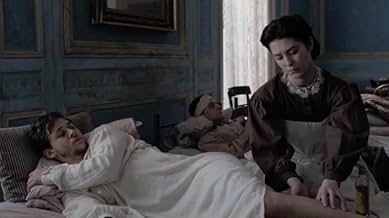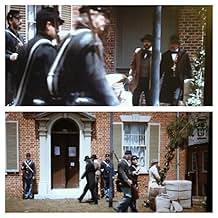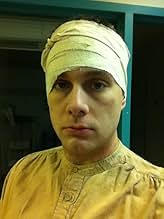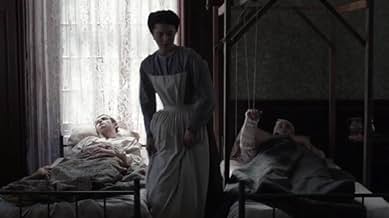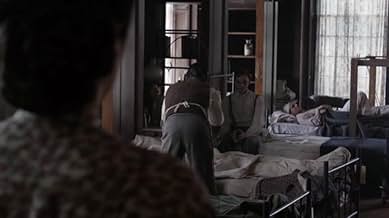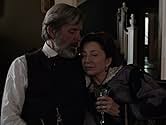IMDb-BEWERTUNG
7,5/10
3066
IHRE BEWERTUNG
Das Leben zweier freiwilliger Krankenschwestern, die im Bürgerkrieg auf unterschiedlichen Seiten standen - die Abolitionistin Mary Phinney aus Neuengland und die Anhängerin der Konföderierte... Alles lesenDas Leben zweier freiwilliger Krankenschwestern, die im Bürgerkrieg auf unterschiedlichen Seiten standen - die Abolitionistin Mary Phinney aus Neuengland und die Anhängerin der Konföderierten Emma Green.Das Leben zweier freiwilliger Krankenschwestern, die im Bürgerkrieg auf unterschiedlichen Seiten standen - die Abolitionistin Mary Phinney aus Neuengland und die Anhängerin der Konföderierten Emma Green.
- Auszeichnungen
- 1 wins total
Folgen durchsuchen
Empfohlene Bewertungen
This series is unique for presenting the ambivalence and contradictions of the Civil War Era. The protagonist nurse is a staunch abolitionist who is made to accept the need to also help Confederate wounded by a doctor who is loyal to the Union and thus a traitor to his slave- owning pro-Confederate Maryland family. Nevertheless he is unmoved by abolitionist sentiments--until he meets a free black Philadelphia man he admires.
The head of the Southern family that owns the hotel-turned hospital works to save his holdings and business interests while not betraying his Southern loyalties. He opposes efforts by Union soldiers to enforce claims to return runaway slaves (seems unhistorical here set in 1862- -I thought the Union stopped returning "contraband" in 1861.)
The African-American characters debate the merits of freedom versus the security of slavery or of employment not much removed from slavery.
In short, the moral certainties of hindsight are removed and the characters must struggle in their contemporary context. I do enjoy that.
Some casting choices were surprising but they all work.
The head of the Southern family that owns the hotel-turned hospital works to save his holdings and business interests while not betraying his Southern loyalties. He opposes efforts by Union soldiers to enforce claims to return runaway slaves (seems unhistorical here set in 1862- -I thought the Union stopped returning "contraband" in 1861.)
The African-American characters debate the merits of freedom versus the security of slavery or of employment not much removed from slavery.
In short, the moral certainties of hindsight are removed and the characters must struggle in their contemporary context. I do enjoy that.
Some casting choices were surprising but they all work.
I had high hopes for Mercy Street. Fictionalized history has become increasingly popular in recent years, and this show had potential to be one of the more memorable ones, with a previously untapped setting and a cast full of talented actors. Sadly, the show has turned out to be mostly unremarkable.
The basic premise is simple: a widowed woman is sent to become head nurse at a military hospital converted from a hotel in Union-occupied Alexandria, Virginia. On top of this premise, the show's writers have piled enough dramatic crises and neurotic characters to populate a full soap opera. Everyone is constantly shouting at each other and plotting behind each other's backs.
Given the setting, conflict and friction is understandable, and of course a drama needs, well, drama. But with only six episodes, they've created enough plot lines to easily fill a US-standard 22-episode season, if not more. Everything is just so busy that the only way we learn anything about the characters is through their conflicts. Calm moments are few and far between. Most performances border on scenery- chewing, except of course when they jump well past that border.
That said, there are a number of things to enjoy. Mary Elizabeth Winstead, always a treat, seems so comfortable with the trappings of the period you'd think she was born into it. Donna Murphy is exquisite as the quintessential Southern matriarch, turning borderline overacting into a virtue. Tara Summers has channeled all the snarky disdain of Alan Rickman while Jack Falahee is the spitting image in looks and charm of a young Johnny Depp. Gary Cole, one of the few cast members not constantly gnaw at the walls, adds just enough temper to his usual near-deadpan dryness to be a realistic Southern businessman trying to hold onto what little he has left after the Union takes everything.
The real surprise, though, is Josh Radnor. If you've only seen him in How I Met Your Mother, you'd have no idea that he's capable of the quietly powerful performance he turns in here. Yes, he does spend a lot of time chomping on the set, but he balances that with more subtle moments that reveal significant talent he hasn't had much opportunity to utilize. In many ways, he reminds me of Mandy Patinkin in his younger days.
Ultimately, the show is entertaining enough to be worth watching if you like fictionalized history. Just don't expect more from it than it is.
The basic premise is simple: a widowed woman is sent to become head nurse at a military hospital converted from a hotel in Union-occupied Alexandria, Virginia. On top of this premise, the show's writers have piled enough dramatic crises and neurotic characters to populate a full soap opera. Everyone is constantly shouting at each other and plotting behind each other's backs.
Given the setting, conflict and friction is understandable, and of course a drama needs, well, drama. But with only six episodes, they've created enough plot lines to easily fill a US-standard 22-episode season, if not more. Everything is just so busy that the only way we learn anything about the characters is through their conflicts. Calm moments are few and far between. Most performances border on scenery- chewing, except of course when they jump well past that border.
That said, there are a number of things to enjoy. Mary Elizabeth Winstead, always a treat, seems so comfortable with the trappings of the period you'd think she was born into it. Donna Murphy is exquisite as the quintessential Southern matriarch, turning borderline overacting into a virtue. Tara Summers has channeled all the snarky disdain of Alan Rickman while Jack Falahee is the spitting image in looks and charm of a young Johnny Depp. Gary Cole, one of the few cast members not constantly gnaw at the walls, adds just enough temper to his usual near-deadpan dryness to be a realistic Southern businessman trying to hold onto what little he has left after the Union takes everything.
The real surprise, though, is Josh Radnor. If you've only seen him in How I Met Your Mother, you'd have no idea that he's capable of the quietly powerful performance he turns in here. Yes, he does spend a lot of time chomping on the set, but he balances that with more subtle moments that reveal significant talent he hasn't had much opportunity to utilize. In many ways, he reminds me of Mandy Patinkin in his younger days.
Ultimately, the show is entertaining enough to be worth watching if you like fictionalized history. Just don't expect more from it than it is.
I'm hopeful that this series marks a start to some quality original PBS programming rather than more transatlantic imports from the BBC or ITV. So far so good. I'm curious about some of the message board complaints about the gory nature of the surgery scenes. I would rather see the good, the bad, and the ugly instead of a watered down, whitewashed, and sanitized presentation. I like my stories with some real grit. The characters have some real depth. I don't like put-on southern accents. Like fake snow it diminishes the realism of the scene. And this series has lots of that. But (at least so far) the people of color have more to do in this story than serve angry white people. The Civil War is a dramatic season in our nation's history. It's not always a pretty story. But as a backdrop for this drama it is told with some dignity and respect for all the players, regardless of their uniform. I think we could use more of that attitude today.
10itazuke
I love this series....after reading some of the reviews I realized how 'nit-picky' some people are...they should be grateful that there are programs like this on television.......today we have such garbage for a selection of programs....who cares if the dialog is lame or if nurses talk back to doctors and it wasn't customary of the day, but mind you, there have been feisty and independent women throughout history .....enjoy the non-commercial program and take in a little bit of how harsh our ancestors really did have it......or go watch some lame 'reality' show on TLC. We need more period movies and series on television
I'm not sure why any viewer would compare a series set during American revolutionary times (the Civil War) to Downton Abbey. Downton Abbey was simply a remake of the popular (and recently remade) series, Upstairs, Downstairs. It was mostly an entertaining soap about a rich family and their household, but I digress...
First off, all of the actors are well-cast and do suitably good work. It's only been two episodes, so we'll have to wait and see as far as whether any heavy lifting will be required, acting wise. It's safe to say that we should expect to see the transformation of some of the characters, insofar as their beliefs are portrayed. There is a doctor, for example, who has no problem with slavery, but believes that it is his duty to equally treat Union and Confederate soldiers because, "Blood does not run grey or blue, it runs red." The nurse to whom he makes this argument (Nurse Mary/Baroness), is a staunch supporter of the Union and believes that as a Union hospital, Union soldiers can claim priority.
We have familiar faces in this cast - L. Scott Caldwell, Donna Murphy, Gary Cole, Tara Summers, and new ones in Shalita Grant, McKinley Belcher III, and Mary Elizabeth Winstead. While Mercy Street bears some similarity to The Knick due to its setting (a hospital) and a promise of change to come, it is less graphic in its portrayal of the everyday occurrences of the medical world.
With the popularity of Hamilton on today's Broadway stage, Mercy Street is a welcome addition to the TV lineup, as anything that encourages today's American to learn about the past is a boon, indeed.
First off, all of the actors are well-cast and do suitably good work. It's only been two episodes, so we'll have to wait and see as far as whether any heavy lifting will be required, acting wise. It's safe to say that we should expect to see the transformation of some of the characters, insofar as their beliefs are portrayed. There is a doctor, for example, who has no problem with slavery, but believes that it is his duty to equally treat Union and Confederate soldiers because, "Blood does not run grey or blue, it runs red." The nurse to whom he makes this argument (Nurse Mary/Baroness), is a staunch supporter of the Union and believes that as a Union hospital, Union soldiers can claim priority.
We have familiar faces in this cast - L. Scott Caldwell, Donna Murphy, Gary Cole, Tara Summers, and new ones in Shalita Grant, McKinley Belcher III, and Mary Elizabeth Winstead. While Mercy Street bears some similarity to The Knick due to its setting (a hospital) and a promise of change to come, it is less graphic in its portrayal of the everyday occurrences of the medical world.
With the popularity of Hamilton on today's Broadway stage, Mercy Street is a welcome addition to the TV lineup, as anything that encourages today's American to learn about the past is a boon, indeed.
Wusstest du schon
- WissenswertesThe real Alice Green actually died a few weeks short of her 15th birthday in early 1860, over a year before the start of the Civil War.
Top-Auswahl
Melde dich zum Bewerten an und greife auf die Watchlist für personalisierte Empfehlungen zu.
- How many seasons does Mercy Street have?Powered by Alexa
Details
- Erscheinungsdatum
- Herkunftsland
- Offizielle Standorte
- Sprache
- Auch bekannt als
- Улица милосердия
- Drehorte
- Laburnum House - 1300 Westwood Avenue, Richmond, Virginia, USA(Mansion House Hotel)
- Produktionsfirmen
- Weitere beteiligte Unternehmen bei IMDbPro anzeigen
Zu dieser Seite beitragen
Bearbeitung vorschlagen oder fehlenden Inhalt hinzufügen





